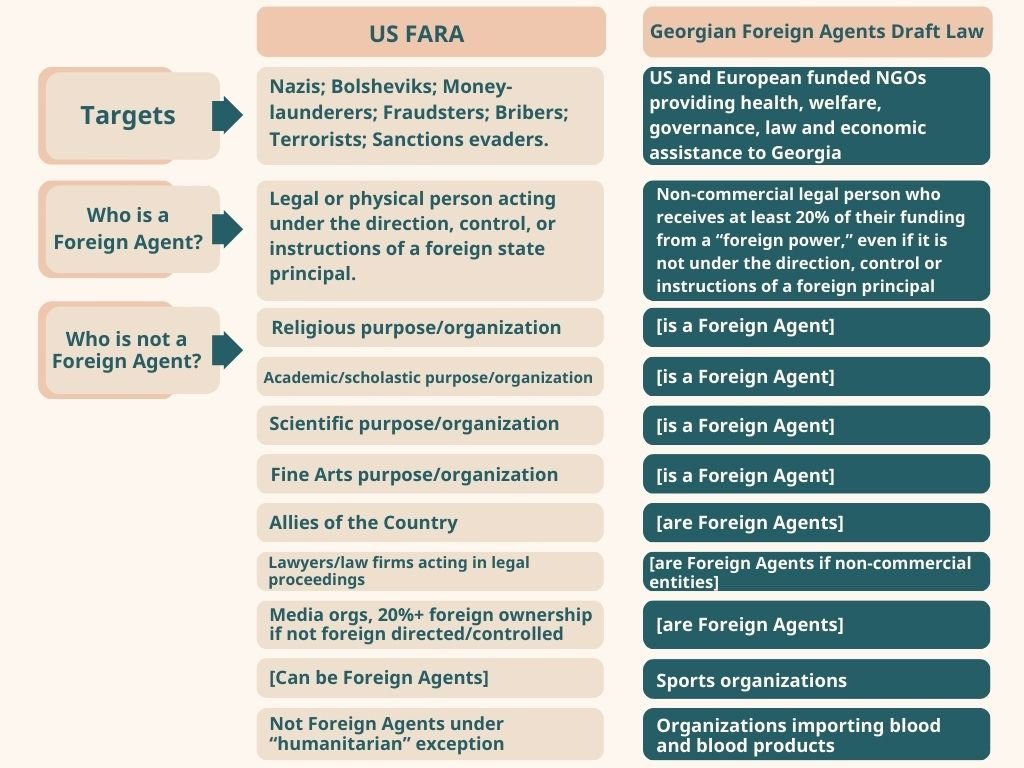
US FARA vs. Georgian Foreign Agents Law: Three Major Differences
For well over a year, we have heard Georgian Dream call their proposed law on Foreign Agents an “American law.” And during the same time, we have heard opponents of the law call it a Russian law. While there has been an abundance of rhetoric on the subject, there has been very little factual or legal analysis put before the public to explain the truth of these dueling accusations.
A cursory examination reveals that the Georgian law is fundamentally different from the American law, closer to the Russian law, and in at least one important respect, even harsher than the Russian law.

Ted Jonas, a dual US-Georgian citizen, has lived in Georgia for nearly 30 years. An international lawyer and environmental activist, he was part of the original team that opened the National Democratic Institute for International Affairs office in Tbilisi in 1994.
Who is Your Enemy?
One of the most fundamental differences between the US Foreign Agents Registration Act (FARA) and the proposed Georgian foreign agents law is the historical context in which the two laws originated, and who they were directed against. The US Congress adopted FARA in 1938 specifically to target lobbying and consulting firms acting on behalf of the Nazi German government. Concern about Soviet Communist agents also motivated the law. Of course, by 1938, the United States under Franklin D. Roosevelt was already well aware that Nazi Germany presented a direct military and security threat to the country.
In contrast, advocates for Georgia’s foreign agents law – the Georgian Dream party leadership – have mentioned only United States and EU funding for Georgian NGOs as the source of foreign agents in Georgia. Georgian Dream politicians howl about “a second front,” and US and EU funding of “revolution.” In short, the Georgian Dream has put the United States and the EU in the same category as the United States put Nazi Germany in 1938. This, despite the fact that the US and EU have given Georgia billions of dollars and Euro in foreign assistance for over 30 years, the Georgian Dream government claims it seeks to join the EU, and it calls the United States its partner. And yet, with this law (as well as its daily rhetoric) Georgian Dream treats the US and the EU as enemy powers. The GD in advocating its foreign agents law never mentions the role of Russia – the country that a vast majority of Georgians define as Georgia’s main enemy – in trying to influence Georgian politics and subvert its democracy.
FARA’s origin as an anti-Nazi, anti-Bolshevik law is not just history. The US Justice Department has brought prosecutions under FARA only against individuals and organizations associated with money laundering, fraud, sanctions evasion, illegal campaign contributions, bribery, terrorism, and hostile foreign powers. Georgian Dream, instead, has targeted Georgian non-profit organizations which work lawfully and receive financial contributions from the US and member states of the European Union to carry out health, welfare, civil rights, educational, and other such activities in Georgia to benefit its population. None of the US or EU-funded organizations targeted by the Georgian Dream are associated with lawbreaking. All individuals and organizations targeted by the US Justice Department in FARA prosecutions are associated with serious criminal offenses.
Who is a Foreign Agent?
The most fundamental and important legal difference between FARA and the Georgian foreign agents law is how they define a “Foreign Agent.” The Georgian law defines a foreign agent as any non-commercial legal person, which receives more than 20% of its funding from a “foreign power,” which includes companies, foundations, and individuals, not just governments. The US law, on the other hand, defines a foreign agent as any person (legal or physical) who is under the control of, or acts at the direction of, a foreign power and acts in the interests of that foreign power. In short, these are the elements of an agent – a representative – of a foreign power. Financing is only one of several indicators of the link between the principal and the agent. But it is not definitive or exclusive, while under the Georgian law it is both.

The Georgian law contains no requirement that the local grant recipient be controlled by, acting on the instructions of, or acting on behalf of a foreign power, whereas all these elements are required under the US law. The proposed Georgian law would simply require that a Georgian non-profit organization, which has received funds from a foreign power to be considered a foreign agent. This means that the Georgian law casts a far wider net over Georgian society than the US law does over US society. Anyone who is even slightly familiar with how international donors and local NGOs work (and many GD officials are well familiar with it because they used to work for Western-funded projects and NGOs) knows that international donors do not issue instructions to their grant recipients on a principal – agent basis. They require proof of performance of the grant, but they do not dictate the grant recipient’s actions the way a principal does to an agent.
The US law makes no assumption that an organization or a person receiving funds from a foreign power is a foreign agent. The Georgian law assumes that only receiving foreign funds makes an organization a foreign agent. This is an extremely important difference. Georgian organizations which act only in Georgia’s interest – in providing benefits to its population – are labeled foreign agents. In America, individuals and organizations who receive foreign funds and carry out activities that benefit Americans are not labelled “foreign agents.” They are foreign agents only if they act on the specific instructions of a foreign principal.
Moreover, the US law makes a distinction that the Georgian law does not between types of foreign principals. Only a person acting on behalf of a foreign government or political party has to register under FARA. A person acting on behalf of a foreign company or organization is exempted from registering under FARA if they register instead under the less burdensome Lobbying Disclosure Act (your humble correspondent is registered in the United States under the Lobbying Disclosure Act, for lobbying on behalf of a Georgian company). Therefore the US law makes a distinction between an agent acting on behalf of a foreign government, and an agent acting on behalf of private or non-profit interests. The Georgian law makes no such distinction.
Who is Not A Foreign Agent?
The US FARA exempts from the definition of foreign agent all the following persons and organizations:
- Humanitarian aid organizations
- Persons and organizations engaged in the following activities:
- Religious
- Scholastic
- Academic
- Scientific
- Media organizations with foreign ownership whose policies are not directed by a foreign power;
- Allies of the United States
- Lawyers representing clients in legal proceedings
The Georgian law does not exempt any of these persons or activities. Accordingly, under the Georgian law, unlike in the United States, the following are “foreign agents:”
- Georgian organizations which receive funding from allies of Georgia, like the USA, the EU, Japan, and many other friendly countries;
- Humanitarian aid organizations who provide help to the 650,000 Georgians who live below the country’s poverty line;
- Georgian scientific, academic, and artistic organizations which receive foreign funding. Georgian religious organizations which receive foreign funding;
- Media organizations that receive foreign funding, even if their policies are not directed by a foreign power;
- Non-profit entities with foreign funding representing clients in Georgian court and administrative proceedings.
While many of us have called the Georgian law a “Russian law,” it is notable that the Russian law (like the US law) exempts religious organizations from its coverage. That would indicate that the Russian government is more tolerant on the subject of religious freedom than the Georgian government. The Georgian law’s apparently intentional decision to not exempt religious organizations, when the US and Russian laws do so, raises serious questions about the motivation for this particular legislative choice: against which religions and religious organizations will the Georgian foreign agents law be enforced?
Friends and Foes: Blurred Lines
While the US Foreign Agents Registration Act was adopted to monitor the activities of America’s enemies, the Georgian government’s proposed foreign agents law is directed at the country’s friends. The United States and the European Union, whom the GD government accuses daily of trying to overthrow the Georgian government and “open a second front,” have, in every forum and at every opportunity supported Georgia’s territorial integrity. Russia, whom the Georgian Dream never mentions as an agent of foreign influence, has taken 20% of Georgia’s territory and killed thousands of its citizens and soldiers. The United States has given Georgia US $4.5 billion in foreign assistance since 1992; $1 billion of it as emergency aid after the Russian invasion of 2008. Russia has twice in history taken away Georgia’s independence, much more recently taken its territory, and given it nothing but war and threats for the past 30 years. As confirmed by intelligence agencies all over the world, Russia has elaborate covert operations to influence politics in foreign countries, Georgia foremost among them.
The Georgian public should, therefore, recognize the foreign agents law for what it is: an attack on the country’s Western allies, and a present to the Russian Federation, with which its foreign policy is increasingly aligned.
This post is also available in: ქართული Русский